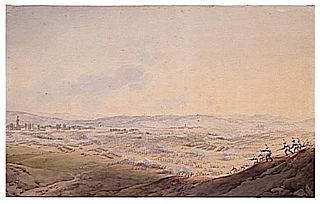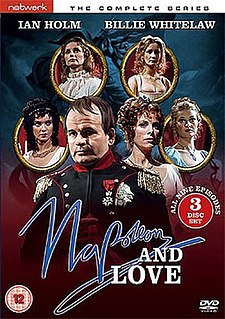
The House of Bonaparte is a former imperial and royal European dynasty of Genoese origin. It was founded in 1804 by Napoleon I, the son of Genoese nobleman Carlo Buonaparte. Napoleon was a French military leader who had risen to power during the French Revolution and who in 1804 transformed the First French Republic into the First French Empire, five years after his coup d'état of November 1799. Napoleon and the Grande Armée had to fight against every major European power and dominated continental Europe through a series of military victories during the Napoleonic Wars. He installed members of his family on the thrones of client states, extending the power of the dynasty.

The Napoleonic Wars (1803–1815) were a series of major conflicts pitting the French Empire and its allies, led by Napoleon I, against a fluctuating array of European powers formed into various coalitions. It produced a brief period of French domination over most of continental Europe. The wars stemmed from the unresolved disputes associated with the French Revolution and its resultant conflict. The wars are often categorised into five conflicts, each termed after the coalition that fought Napoleon: the Third Coalition (1805), the Fourth (1806–07), the Fifth (1809), the Sixth (1813–14), and the Seventh (1815).

Napoleon III was the first President of France from 1848 to 1852 and Emperor of the French from 1852 to 1870. A nephew of Napoleon I, he was the last monarch to reign over France. First elected to the presidency of the Second Republic in 1848, he seized power by force in 1851, when he could not constitutionally be reelected; he later proclaimed himself Emperor of the French. He founded the Second Empire, reigning until the defeat of the French Army and his capture by Prussia and its allies at the Battle of Sedan in 1870. He oversaw the modernisation of the French economy, besides working to have the centre of Paris rebuilt following Napoleon III style guidelines. He was a popular monarch, who used plebiscites to guide his actions. Napoleon III expanded the French overseas empire and made the French merchant navy the second largest in the world, engaged in the Crimean War, the Second Italian War of Independence, the Second Franco-Mexican War, as well as the disastrous Franco-Prussian War, in which he served alongside his soldiers during the fight, an uncommon action for a head of state in the modern era.

Napoléon Bonaparte was a French military and political leader of Corsican descent. He rose to prominence during the French Revolution and led several successful campaigns during the Revolutionary Wars. As Napoleon I, he was Emperor of the French from 1804 until 1814, and again in 1815. Napoleon dominated European and global affairs for more than a decade while leading France against a series of coalitions in the Napoleonic Wars. He won most of these wars and the vast majority of his battles, building a large empire that ruled over continental Europe before its final collapse in 1815. One of the greatest commanders in history, his wars and campaigns are studied at military schools worldwide. He remains one of the most celebrated and controversial political figures in human history.

The Battle of Eckmühl, fought on 21 April – 22 April 1809, was the turning point of the 1809 Campaign, also known as the War of the Fifth Coalition. Napoleon I had been unprepared for the start of hostilities on 10 April 1809, by the Austrians under the Archduke Charles of Austria and for the first time since assuming the French Imperial Crown had been forced to give up the strategic initiative to an opponent. Thanks to the dogged defense waged by the III Corps, commanded by Marshal Davout, and the Bavarian VII Corps, commanded by Marshal Lefebvre, Napoleon was able to defeat the principal Austrian army and wrest the strategic initiative for the remainder of the war.

Michel Ney, 1st Duke of Elchingen, 1st Prince of the Moskva, popularly known as Marshal Ney, was a French military commander and Marshal of the Empire who fought in the French Revolutionary Wars and the Napoleonic Wars. He was one of the original 18 Marshals of the Empire created by Napoleon I. He was known as Le Rougeaud by his men and nicknamed le Brave des Braves by Napoleon.

The French Revolutionary Wars were a series of sweeping military conflicts lasting from 1792 until 1802 and resulting from the French Revolution. They pitted France against Great Britain, the Holy Roman Empire, Prussia, Russia, and several other monarchies. They are divided in two periods: the War of the First Coalition (1792–97) and the War of the Second Coalition (1798–1802). Initially confined to Europe, the fighting gradually assumed a global dimension. After a decade of constant warfare and aggressive diplomacy, France had conquered territories in the Italian Peninsula, the Low Countries and the Rhineland in Europe and was retroceded Louisiana in North America. French success in these conflicts ensured the spread of revolutionary principles over much of Europe.

The Battle of Ulm on 16–19 October 1805 was a series of skirmishes, at the end of the Ulm Campaign, which allowed Napoleon I to trap an entire Austrian army under the command of Karl Freiherr Mack von Leiberich with minimal losses and to force its surrender near Ulm in the Electorate of Bavaria.

Napoleon Dynamite is a 2004 American comedy film produced by Jeremy Coon, Chris Wyatt and Sean Covel, written by Jared and Jerusha Hess and directed by Jared Hess. The film stars Jon Heder in the role of the title character, a high school student who deals with several dilemmas: befriending an immigrant who wants to be class president, awkwardly pursuing a romance with a fellow student, and living with his quirky family.

Jonathan Joseph Heder is an American actor and producer. He is best known for his role as the title character of the 2004 comedy film Napoleon Dynamite. He has also appeared in the films Just Like Heaven, The Benchwarmers, School for Scoundrels, Blades of Glory, Mama's Boy, When in Rome, and as Roy Disney in Walt Before Mickey, and provided voice work for the animated films Monster House, Surf's Up, and Pinocchio, as well as the Napoleon Dynamite animated series.

Napoleon is a 2002 historical miniseries which explored the life of Napoleon Bonaparte. It was the most expensive television miniseries in Europe up to that time, costing an equivalent of (USD) $46,330,000 to produce. The miniseries covered Napoleon's military successes and failures, including the battles of Austerlitz, Eylau, and Waterloo and the retreat from Russia. It also delved into Napoleon's personal life: his marriage to and divorce from Josephine de Beauharnais, his marriage to Marie Louise, the Duchess of Parma and daughter of Francis II, and his affairs with Eleanore Denuelle and Marie Walewska. The series draws from Max Gallo's biography.

The Battle of Haslach-Jungingen, also known as the Battle of Albeck, fought on 11 October 1805 at Ulm-Jungingen north of Ulm at the Danube between French and Austrian forces, was part of the War of the Third Coalition, which was a part of the greater Napoleonic Wars. The outcome of this battle was a French victory.

Castelló d'Empúries is a town and municipality in the Alt Empordà in Girona, Catalonia, Spain. It lies 9 km east of Figueres.

The Battle of Schöngrabern, also known as the Battle of Hollabrunn, was an engagement in the Napoleonic Wars during the War of the Third Coalition, fought on 16 November 1805 near Hollabrunn in Lower Austria, four weeks after the Battle of Ulm and two weeks before the Battle of Austerlitz.

Roustam Raza, also known as Roustan or Rustam, was Napoleon's mamluk bodyguard and secondary valet.

The First French Empire, officially the French Republic then the French Empire, was the empire ruled by Napoleon Bonaparte, who established French hegemony over much of continental Europe at the beginning of the 19th century. Although France had already established a colonial empire overseas since the early 17th century, the French state had remained a kingdom under the Bourbons and a republic after the French Revolution. Historians refer to Napoleon's regime as the First Empire to distinguish it from the restorationist Second Empire (1852–1870) ruled by his nephew Napoleon III.

Napoleon and Love is a 1974 British television series originally aired on ITV and lasting for 9 episodes from 5 March to 30 April 1974. The series stars Ian Holm in the title role as Napoleon and depicts his relationships with the women who featured in his life as a backdrop to his rise and fall.
Napoleon Road is a 1953 French comedy film directed by Jean Delannoy and starring Pierre Fresnay, Henri Vilbert and Claude Laydu. A chancer organises a series of package tours along a route said to have been taken by Napoleon in 1815 when in fact the Emperor never set foot there. The local inhabitants back up his story as they hope to cash in on the tourist boom.
Napoleon Dynamite is an American animated sitcom based on the 2004 indie film of the same name. Set in the small town of Preston, Idaho, it follows the adventures of the titular 16-year-old boy, who thinks he is skilled at everything. The series was created by the film's co-writers and directors Jared and Jerusha Hess, who developed it with Mike Scully and proposed it to Fox.
The Second Battle of Kulm or the Battle of Teplitz was fought on 17 September 1813 upon the heights immediately above the town of Kulm (Chlumec) in northern Bohemia, by a Coalition army commanded by the Austrian field marshal, Prince of Schwarzenberg, and a French army under the command of the Emperor Napoleon. It resulted in an Austrian victory.
















